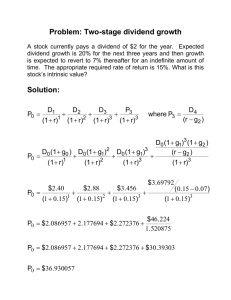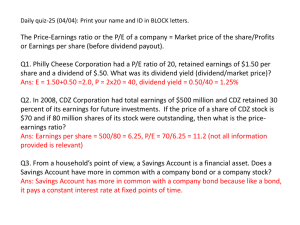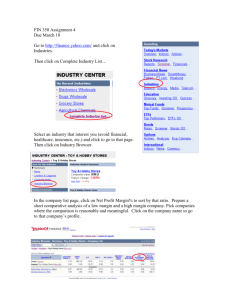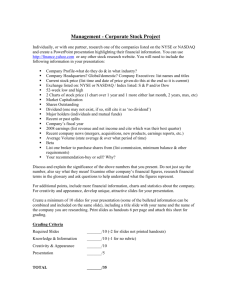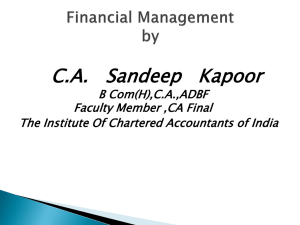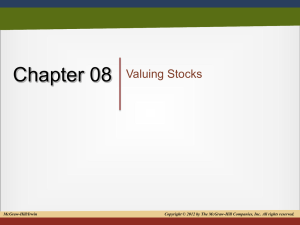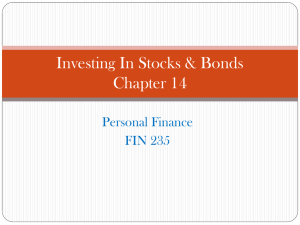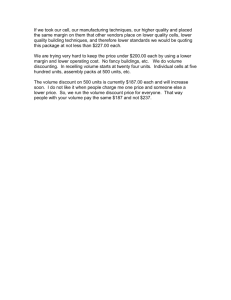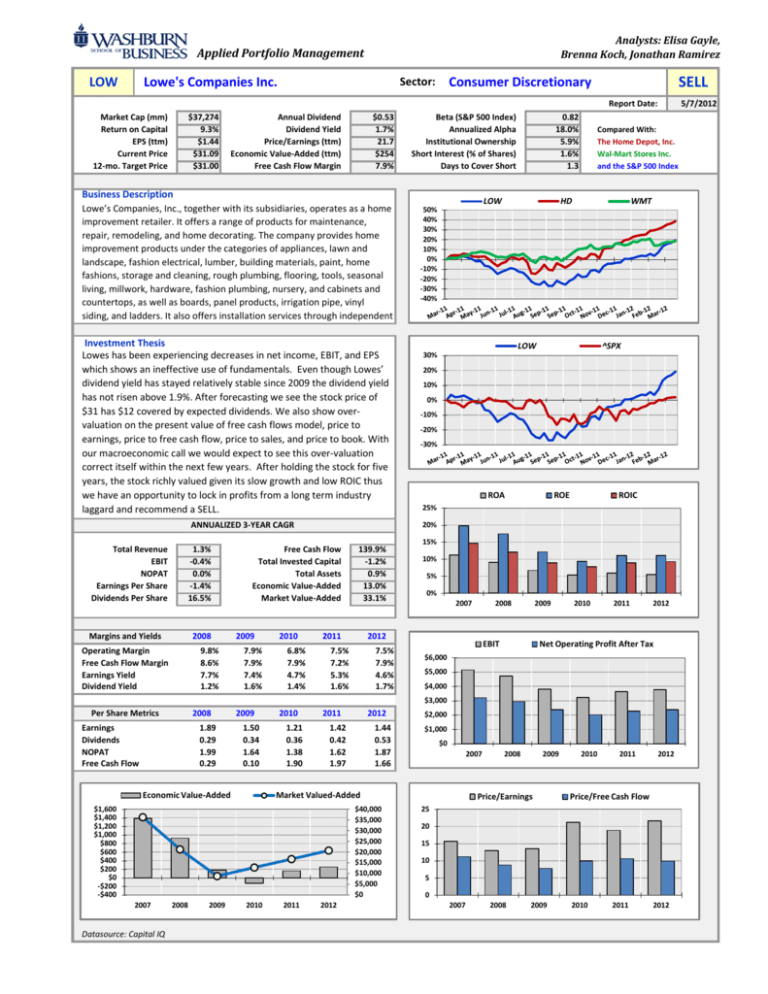
Analysts: Elisa Gayle,
Brenna Koch, Jonathan Ramirez
Applied Portfolio Management
LOW
Lowe's Companies Inc.
SELL
Consumer Discretionary
Sector:
Report Date:
Market Cap (mm)
Return on Capital
EPS (ttm)
Current Price
12-mo. Target Price
$37,274
9.3%
$1.44
$31.09
$31.00
Annual Dividend
Dividend Yield
Price/Earnings (ttm)
Economic Value-Added (ttm)
Free Cash Flow Margin
$0.53
1.7%
21.7
$254
7.9%
Business Description
Lowe’s Companies, Inc., together with its subsidiaries, operates as a home
improvement retailer. It offers a range of products for maintenance,
repair, remodeling, and home decorating. The company provides home
improvement products under the categories of appliances, lawn and
landscape, fashion electrical, lumber, building materials, paint, home
fashions, storage and cleaning, rough plumbing, flooring, tools, seasonal
living, millwork, hardware, fashion plumbing, nursery, and cabinets and
countertops, as well as boards, panel products, irrigation pipe, vinyl
siding, and ladders. It also offers installation services through independent
contractors in various product categories. The company serves
Investment Thesis
Lowes has been experiencing decreases in net income, EBIT, and EPS
which shows an ineffective use of fundamentals. Even though Lowes’
dividend yield has stayed relatively stable since 2009 the dividend yield
has not risen above 1.9%. After forecasting we see the stock price of
$31 has $12 covered by expected dividends. We also show overvaluation on the present value of free cash flows model, price to
earnings, price to free cash flow, price to sales, and price to book. With
our macroeconomic call we would expect to see this over-valuation
correct itself within the next few years. After holding the stock for five
years, the stock richly valued given its slow growth and low ROIC thus
we have an opportunity to lock in profits from a long term industry
laggard and recommend a SELL.
ANNUALIZED 3-YEAR CAGR
Total Revenue
EBIT
NOPAT
Earnings Per Share
Dividends Per Share
1.3%
-0.4%
0.0%
-1.4%
16.5%
Margins and Yields
2008
Operating Margin
Free Cash Flow Margin
Earnings Yield
Dividend Yield
9.8%
8.6%
7.7%
1.2%
7.9%
7.9%
7.4%
1.6%
2010
6.8%
7.9%
4.7%
1.4%
0.82
18.0%
5.9%
1.6%
1.3
LOW
50%
40%
30%
20%
10%
0%
-10%
-20%
-30%
-40%
5/7/2012
Compared With:
The Home Depot, Inc.
Wal-Mart Stores Inc.
and the S&P 500 Index
HD
WMT
LOW
^SPX
30%
20%
10%
0%
-10%
-20%
-30%
ROA
ROE
ROIC
25%
20%
Free Cash Flow
Total Invested Capital
Total Assets
Economic Value-Added
Market Value-Added
2009
Beta (S&P 500 Index)
Annualized Alpha
Institutional Ownership
Short Interest (% of Shares)
Days to Cover Short
139.9%
-1.2%
0.9%
13.0%
33.1%
2011
15%
10%
5%
0%
2007
2008
2012
7.5%
7.2%
5.3%
1.6%
7.5%
7.9%
4.6%
1.7%
2009
EBIT
2010
2011
2012
Net Operating Profit After Tax
$6,000
$5,000
$4,000
$3,000
Per Share Metrics
2008
Earnings
Dividends
NOPAT
Free Cash Flow
1.89
0.29
1.99
0.29
2009
1.50
0.34
1.64
0.10
Economic Value-Added
2010
1.21
0.36
1.38
1.90
2011
2012
1.42
0.42
1.62
1.97
1.44
0.53
1.87
1.66
$40,000
$35,000
$30,000
$25,000
$20,000
$15,000
$10,000
$5,000
$0
Datasource: Capital IQ
2008
2009
$1,000
$0
2007
Market Valued-Added
$1,600
$1,400
$1,200
$1,000
$800
$600
$400
$200
$0
-$200
-$400
2007
$2,000
2010
2011
2012
2008
2009
Price/Earnings
2010
2011
2012
Price/Free Cash Flow
25
20
15
10
5
0
2007
2008
2009
2010
2011
2012
20
28
PRVit® -- the Performance Risk Valuation investment technology
PRVit® is powered by EVA® and EVA Momentum®,
from EVA Dimensions LLC
LOWE'S COMPANIES INC
registered marks of EVA Dimensions LLC
Date
Share
Price
4-May-12
$31.09
Specialty Retail
LOW
Lowe's Companies, Inc., together with its subsidiaries, operates as a home improvement retailer. It offers a
range of products for maintenance, repair, remodeling, and home decorating. The company provides home
improvement products under the categories of appliances, lawn and landscape, fashion electrical, lumber,
building materials, paint, home fashions, storage and cleaning, rough plumbing, flooring, tools, seasonal living,
millwork, hardware, fashion plumbing, nursery, and cabinets and countertops, as well as boards, panel products,
irrigation pipe, vinyl siding, and ladders. It also offers installation services through independent contractors in
various product categories. The company serves homeowners and renters consisting of do-it-yourself customers
and do-it-for-me customers; and commercial business customers who work in construction, repair/remodel,
commercial and residential property management, or business maintenance professions. As of February 3, 2012,
it operated 1,745 stores, including 1,712 stores in 50 U.S. states, 31 stores in Canada, and 2 stores in Mexico.
The company also offers its products through Lowes.com. Lowe's Companies, Inc. was founded in 1946 and is
based in Mooresville, North Carolina.
Performance Score (P)
LOW
25th
50th
75th
% Russell
0.3%
0.5%
-5.3%
-3.4%
0.6%
0.7%
4.6%
4.8%
46
48
P2 Trend
The growth rate in the firm's economic profit (its EVA)
EVA Momentum (vs Cap)
3 Year Trend (ΔEVA/Cap)
Last Quarter (ΔEVA/Cap)
LOW
25th
50th
75th
% Russell
-0.2%
0.0%
1.0%
-1.0%
-0.3%
-1.9%
0.6%
0.7%
0.5%
2.4%
2.2%
2.6%
34
30
57
Risk Score (R)
12
21
R1
Lower is better
Volatility
Variability in stock price and the EVA profit margin
Stock Price Volatility
EVA Margin Variability
42
R2
LOW
25th
50th
75th
% Russell
28%
0.8%
36%
2.0%
46%
4.4%
57%
11.8%
9
5
Vulnerability
25th
50th
75th
% Russell
Free Cash Flow Rate
Op Cash Gen Return
10%
13%
6%
54%
0%
23%
-10%
11%
16
72
Total Debt/Total Capital
Total Debt/EBITDAR
37%
1.8
8%
0.7
25%
1.9
45%
3.5
66
48
Valuation Score (V)
79
61
V1
MVA Margin
MVA Spread
54
LOW
25th
50th
75th
% Russell
39%
71%
-8%
-7%
37%
30%
129%
117%
51
66
V2 Wealth Multiples
Valuation multiples to cash flow, earnings, EVA
EBITDAR Multiple
NOPAT Multiple
Future Growth Reliance
LOW
25th
50th
75th
% Russell
8.0
22.0
35%
5.5
14.6
-13%
7.5
19.8
20%
10.2
27.3
62%
56
60
61
The PRVit Matrix: depicts a company’s PRVit score by plotting its “intrinsic” value score – what PRVit rates the firm is truly
worth based on its risk-adjusted performance, i.e., its comparative P-R score – against its actual valuation score – which
reflects the company’s current trading multiples. Companies rated “Hold” plot along the diagonal, which is where the firms’
actual valuation multiples align with their intrinsic values. “Buys” plot in the upper right green zone, which is where PRVit rates
the firms as worth more than their current share values, and “Sells” appear in the lower left red zone, where the firms’ P-R
scores fall short of their V scores. The top grid rates the firms against the entire market, and the lower one ranks them against
industry peers (which is the basis for the official “PRVit” score).
Sales vs. Capital
ROC vs. COC
$60,000
$50,000
$40,000
$0
1/07
1/08
1/09
Sales
1/10
Capital
1/11
1/12
60
80
60
LOW
40
20
0
100
80
60
$35,000
$1,400
90
$30,000
$1,200
$1,000
$25,000
$800
$20,000
$600
$15,000
4%
$10,000
2%
$5,000
0%
$0
1/08
1/09
ROC
1/10
40
20
0
Actual Valuation Vs. Industry
(V=74th Percentile)
PRVit Scores
16%
1/07
40
20
0
Actual Valuation Vs. Russell 3000
(V=79th Percentile)
LOW PRVit Score Vs Industry 24
100
6%
$10,000
80
$1,600
8%
$20,000
20
Market Value Added (MVA) vs. EVA
10%
$30,000
40
$40,000
12%
1/11
COC
1/12
$400
1/08
1/09
1/10
MVA
1/11
80
70
60
50
40
30
$200
20
$0
10
-$200
1/07
Buy
80-100
LOW
60
18%
14%
Overweight
60-79
80
100
Valuation multiples to book capital (as adjusted)
Hold
40-59
LOW PRVit Score Vs Market 26
100
Lower is better
Wealth Ratios
24
46
0
Leveraged, negative cash flow firms are suspect
LOW
Underweight
20-39
100
Financial strength in generating a return on capital over the full cost
EVA Margin (EVA/Sales)
EVA Spread (EVA/Capital)
28
Higher is better
Intrinsic Value Vs. Russell 3000
(P(37)-R(12)=56th Percentile)
P1 Profitability
(vs Industry)
LOW's PRVit score is at the 24th percentile of all firms in its industry, which
leads to a recommendation to Underweight. LOW is less attractively priced
in relation to its true value than well over half of the stocks in its industry.
Intrinsic Value Vs. Industry
(P(31)-R(4)=52nd Percentile)
48
26
PRVit Score
LOW's weak performance (37th percentile vs. Russell 3000 companies),
coupled with its very low risk (12th percentile), indicates a moderate
intrinsic valuation is warranted (56th percentile), which compared to its
actual market valuation (79th percentile at its $31.09 share price) makes for
a PRVit score of 26th percentile vs. the market.
Sell
0-19
37
PRVit Score Industry
(vs Market) Median
0
1/12
EVA
EVA Dimensions LLC l 15 Watersedge Court l Locust Valley, NY 11560 l Support Hot Line 1.888.500.3560 l support@evadimensions.com
No part of this report may be reproduced or distributed in any form except to authorized licensees of EVA Dimensions LLC
Copyright 2010 All Rights Reserved
1/07
1/08
1/09
Vs Market
1/10
1/11
Vs Industry
1/12
Investment Thesis
Concerns regarding the Home Improvement Industry have led us to evaluate LOW which
is a current stock in the Washburn University Student Investment Fund.
Even though LOW has maintained stable revenues over the past five years, Net Income,
EBIT and EPS have all shown decreases since 2007. This is a large concern for the
company’s future profitability.
Gross Profit margin has stayed stable over the past five years (2007-2012), but
Operating Profit Margin and Net Profit Margin have both decreased since 2007. OPM
dropped from roughly 10% in 2007 to 7.5% in 2012 and Net Profit Margin dropped from
roughly 6% in 2007 to 4% in 2012. This illustrates a ineffectiveness of fundamentals.
Since 2009 the dividend yield has been relatively stable, but has not risen above 1.9%.
Even though the dividend yield is stable, the level is lower than that desired yield for the
Student Investment Fund.
The Macroeconomic call the Applied Portfolio Management class developed calls for an
economic slow-down which would decrease the value of this stock. This stock has
reached a level that would allow for a profitable sale.
Highlights
LOW has been able to maintain a slow long term revenue growth rate of approximately
1.5%.
LOW fiscal analysis stated that Operating Profit was expected to decrease .8% to .9%.
The company estimates that .8% of that decrease would be related with store closing
and discontinuation of products.
LOW estimated that EPS would decrease to $1.37 from $1.40 for the fiscal year ended
February 3, 2012. LOW also indicated that they estimate $.0.20 of the impact would be
related to store closings and the discontinuing of products.
LOW has declared a cash dividend since becoming a public company in 1961.
Macroeconomic Thesis
Consumer spending has been on a decline since 2009 and personal income has also seen a
declining trend. LOW struggles under these conditions because most of their products are not
considered necessities and are included under the consumer discretionary sector. An economy
that is struggling to gain traction combined with the news of a weakening housing market
portrays a glim future for LOW.
International Exposure
LOW currently has 1712 stores in the United States and recently has begun to expand
internationally. LOW has opened several stores in Canada and now has two in Mexico with
plans to continue to increase international stores in the future. In 2009, LOW entered into a
joint venture with Woolworth limited to development of chains of home improvement stores in
Australia. These stores were set to open in late 2011 but not a single store has opened as of
now.
1 Year Returns
6 Month Returns
As shown on these four graphs above, LOW stock has been on an overall increasing trend. This
upcoming trend can be accredited to a positive outlook on the housing market and reporting
higher than expected profits due to a mild winter profit nationwide. However, the company
analysis will support the theory that this increasing trend is not guaranteed to continue into the
upcoming future.
Industry Presences
Technological Improvements
In 2010 LOW made the largest investment in stores technology in the company’s history. This
investment should lead to improvements in customer service, such as allowing for free Wi-Fi
usage. LOW also made improvements to their website, which has led to a 70% increase in ecommerce sales in the past year.
Market Share
The home improvement/renovation industry generated approximately $300 billion dollars in
2011. In 2011 LOW generated 50.2 billion dollars in revenue which accounts for 16.7% of the
total market share for this industry. LOW is second in market share to HD which generated
70.4 billion in sales in 2011 and has 23.4% of the market share. Low will see an opportunity to
increase their market share in the future with Sears declaring bankruptcy. Sears competes with
LOW in sales of appliances and hardware which account for 11% and 6% of LOW overall
revenue.
LOW
HD
Revenue
(in
billions)
50.208
70.395
Profit Margin
Dividend Yield
ROIC
3.9%
5.6%
1.9%
2.24%
9.5%
14.4%
Model Assumptions
Our valuation of LOW was done using conservative numbers to assess the value of the
company. Our discounted free cash flow model generated a current intrinsic value of $17.24,
which indicates that LOW is currently over-valued.
Income Statement Inputs
Revenue Growth: Over the last five years LOW has experienced decreases in revenue in
2009 and 2010 of -.1% and -2.1%. This can be attributed to the recession of 2008 which
led to a decrease in consumer spending because of a lack of discretionary income.
These periods of negative revenue growth led to an average of 1.4% revenue growth
over the last 5 years. LOW management forecast revenue growth between 2% and 3%
for the next year and slow long term growth in periods after. So to remain conservative
in our forecasting assumptions we have chosen a long-term growth rate of 1.5%.
Net Profit Margin: The NPM average over the past 5 years is 4.4%. Looking at the last
three years percentages; we decreased the net margin to 3.8% which is the average
from 2010-2012.
Year
Net Profit Margin
2011
4.1%
2012
3.7%
2013
3.8%
Share Growth: Recently LOW announced a plan to raise 2 billion dollars in the bond
market to repurchase outstanding shares. The plan states that they will buy back shares
annually through 2015. LOW had a common share growth rate of -9.3% in 2012 and we
expect this level of buyback to remain stable for 2013 and then begin to taper down to a
long term buyback rate of -.1%.
Year
Common Share
Growth
2010
3.8%
2012
-9.3%
2013
-8%
2014
-6%
2015
-4%
2016
-2%
2017
-.1%
Dividend Growth: LOW has declared a dividend since 1961 when they first became a
publicly traded company. Over the past 5 years LOW has an average dividend growth
rate of 24.1%. This is skewed from 2008 growth rate of 61.1%. Therefore we decreased
the forecasted growth rates as follows.
Year
Dividend Growth
2013
20%
2014
15%
2015
10%
2016
5%
2017
3%
This allows for a margin of safety as well as tapering down to what we believe as the perpetual
dividend growth.
Financial Analysis
Return on Equity (ROE) and Return on
Assets (ROA)
Return on Assets decreased from 11%
in 2007 to 5.5% in 2010. From 2010 to
2012, ROA has stabilized. ROE
decreased from 20% in 2007 to 9% in
2010 and then began recovery in 2011
and 2012. These levels are low and
have not shown signs of full recovery.
Earnings Yield and Dividend Yield
The earnings yield decreased from 7.9%
in 2008 to less than 5% in 2010. EPS has
not shown signs of recovering. The
dividends yield is gradually increasing
over the past six years; however, the
dividend yield has not exceeded 1.9%.
The dividend yield has not reached the
desired level for the Washburn University
Student Investment Fund.
Value Creation Metrics
Net Operating Profit After Tax and Free
Cash Flow
NOPAT shows a decrease from year 2008
to 2012. While free cash flow has high
volatility with a decreasing trend over
the past three years.
Economic Value Added and Market
Value Added
EVA and MVA have sharp decreases from
2007 to 2009. The Market seemed to
over appreciate Lowes stock since the
positive trend for MVA began a year
before the positive EVA trend. The
difference from the two variables has
been consistently similar over the past
three years showing the growing over
evaluation.
Value Spread: ROIC to WACC
One of the major contributions to evaluating value creation is determining the ROIC to WACC
Spread.
Return on Invested Capital (ROIC) and
ROIC to WACC spread.
ROIC decreased from 15% in 2007 to
about 7% in 2010. In 2011 and 2012
ROIC has stabilized to around 9.3%.
With a WASS of 8.3, ROIC-WACC
Spread is 1%. This spread is very small
and does not contribute a great deal to
the value creation process.
Weighted Average Cost of Capital (WACC) Assumptions
A WACC of 8.3% was calculated
using.
Short term debt cost of
2.27%
Long term growth rate of
2.0%
Cost of Equity of 9.3% was
calculated using:
o Risk Free Rate of
2.27%
o Market risk
premium of 7.0%
o Beta of 1.0
Other Analyst Recommendation
These results were derived
from the performance risk
valuation investment theory
which is provided by EVA
Dimensions LLC. The PRVit
Scores are used to further
strengthen our
understanding of the Lowes
stock prices, versus their
value potential. We conclude
that this method also
matches our finding that
Lowes stock is significantly
over valued.
When comparing LOW’s stock versus the
industry average we conclude the actual
valuation is within the 80th percentile.
This indicates significant overvaluation.
On the vertical axis the intrinsic value of
LOW’s stock is compared to the
industry’s average intrinsic value. LOW’s
stock is in the 54th percentile showing it
has average intrinsic value for the
industry. After intersecting the values we
can see it is below the line indicating a
sell recommendation.
Financial Stability
Since 2009, LOW stock has become increasingly overvalued.
Looking at the Dividend Discount Model, the Intrinsic Value of the Dividends account for $12.15
of the $31.09 of the stock. This impact on the valuation will be shown on the recommendation
summary of the report. If the stock was purchased today at $31.09 the expected return on the
stock, based on the dividend stream alone, would be -14.8%.
Recommendation Summary
Due to LOW’s over evaluation in all of our models, decreasing net income, EBIT and EPS we rate
LOW as a SELL stock for the Student Investment Fund.
Over evaluation for the dividend discount model shows this stock is not performing
above average in dividends and we can see this confirmed by noting the 1.7% dividend
yield. The dividend yield has never increased above 1.9% since 2009. This is not ideal for
the student investment fund.
LOW is over evaluated for the present value of free cash flows model which concludes
the expected income is less than what is needed to support the stock price.
When LOW stock price is compared to earnings, free cash flow, sales and to book value
it is consistently over-valued.
The Macroeconomic call the Applied Portfolio Management class developed calls for an
economic slow-down which would decrease the value of this stock.
Lowe's Companies Inc.
LOW
Sector
Consumer Discretionary
Stock Price
$31.09
Historical Income Statements
Report Date
5/7/2012
Historical Balance Sheets
2007
2008
2009
2010
2011
2012
Total Revenue
Cost of Goods Sold
Gross Profit
46,927
30,729
16,198
48,283
31,556
16,727
48,230
31,729
16,501
47,220
30,757
16,463
48,815
31,663
17,152
50,208
32,858
17,350
Cash and Equivalents
Short-Term Investments
Total Cash & ST Invest.
ASSETS
2007
2010
2011
2012
364
184
548
SG&A Expense
R&D Expense
Dep. & Amort.
Other Oper. Exp.
9,879
0
1,162
41,770
10,628
0
1,366
43,550
11,155
0
1,539
44,423
11,623
0
1,614
43,994
11,925
0
1,586
45,174
12,107
0
1,480
46,445
Total Receivables
Inventory
Prepaid Expenses
Total Current Assets
Operating Income
Interest Expense
Other Non-Oper. Exp.
EBT ex-Unusuals
5,157
(206)
0
5,003
4,733
(239)
0
4,539
3,807
(320)
0
3,527
3,226
(304)
0
2,939
3,641
(344)
0
3,309
3,763
(383)
0
3,392
Total Unusual Exp.
Earnings Before Tax
(5)
4,998
(28)
4,511
(21)
3,506
(114)
2,825
(81)
3,228
Income Tax Expense
Net Income
1,893
3,105
1,702
2,809
1,311
2,195
1,042
1,783
1,218
2,010
2008
281
82
363
2009
245
416
661
632
425
1,057
652
471
1,123
1,014
286
1,300
0
7,144
0
8,314
0
7,611
0
8,686
0
8,209
0
9,190
0
8,249
0
9,732
0
8,321
0
9,967
0
8,355
0
10,072
Gross PPE
Accumulated Depr.
Net PPE
Long-Term Investments
25,104
(6,133)
18,971
133
28,836
(7,475)
21,361
337
31,477
(8,755)
22,722
110
32,268
(9,769)
22,499
75
33,345
(11,256)
22,089
748
34,332
(12,362)
21,970
242
(486)
2,906
Goodwill
Total Assets
0
27,767
0
30,869
0
32,625
0
33,005
0
33,699
0
33,559
1,067
1,839
LIABILITIES AND EQUITY
Accounts Payable
3,524
3,713
4,109
4,287
4,351
4,352
1,075
23
6,539
4,325
1,138
1,064
7,751
5,576
434
987
7,560
5,039
1,213
0
7,355
4,528
1,318
0
7,119
6,537
1,317
0
7,891
6,669
Diluted EPS
Total Diluted Shares
Dividends Per Share
1.99
1,566
0.18
1.86
1,507
0.29
1.49
1,468
0.34
1.21
1,464
0.36
1.42
1,403
0.42
1.43
1,273
0.53
Accrued Expenses
Short-Term Debt
Total Current Liab.
Long-Term Debt
Effective Tax Rate
37.9%
37.7%
37.4%
37.4%
37.7%
36.7%
Pension Benefits
Total Liabilities
0
12,042
0
14,771
0
14,570
0
13,936
0
15,587
0
17,026
2.02
1,535
6,394
5,157
6,712
2.82
$31.61
1.89
1,481
6,197
4,733
6,566
2.80
$24.53
1.50
1,457
5,474
3,807
5,873
2.62
$20.32
1.21
1,462
4,959
3,226
5,369
2.56
$25.63
1.42
1,401
5,325
3,641
5,727
2.52
$26.82
1.44
1,271
5,342
3,763
5,752
3.14
$31.09
Preferred Equity
Common Stock & APIC
Retained Earnings
Treasury Stock
Total Common Equity
Total Equity
Total Liab. and Equity
0
864
14,860
0
15,725
15,725
27,767
0
745
15,345
0
16,098
16,098
30,869
0
1,012
17,049
0
18,055
18,055
32,625
0
735
18,307
0
19,069
19,069
33,005
0
688
17,371
0
18,112
18,112
33,699
0
635
15,852
0
16,533
16,533
33,559
Earnings Per Share
Total Common Shares
EBITDA
EBIT
EBITDAR
Free Cash Flow/Share
Year-end Stock Price
Total Revenue
Net Income
Earnings Per Share
$60,000
$2.50
$50,000
$2.00
$40,000
Dividends Per Share
EBITDA
$6,000
$5,000
$1.50
$4,000
$1.00
$3,000
$30,000
$20,000
$10,000
$0.50
$0
$0.00
2007
2008
2009
2010
LOW Performance Analysis. Datasource: CapitalIQ
2011
2012
EBIT
$7,000
$2,000
$1,000
$0
2007
2008
2009
2010
2011
2012
Historical Performance, Page 1 of 4
2007
2008
2009
2010
2011
2012
Analysts: Elisa Gayle, Brenna Koch, Jonathan Ramirez
Margins
2007
Gross Profit Margin
Operating Profit Margin
Net Profit Margin
Free Cash Flow Margin
2008
34.5%
11.0%
6.6%
9.2%
Gross Profit Margin
2009
34.6%
9.8%
5.8%
8.6%
34.2%
7.9%
4.6%
7.9%
2010
2011
34.9%
6.8%
3.8%
7.9%
2012
35.1%
7.5%
4.1%
7.2%
Operating Profit Margin
Relative Valuation
34.6%
7.5%
3.7%
7.9%
Price/Earnings
40%
35%
30%
25%
20%
15%
10%
5%
0%
2007
Price/Earnings
Price/Book
Price/Free Cash Flow
Earnings Yield
Dividend Yield
2008
15.6
1.7
11.2
6.4%
0.6%
Price/Free Cash Flow
15
10
5
0
2009
Liquidity and Debt
2010
2007
Current Ratio
Quick Ratio
Days Sales Outstanding
Inventory Turnover
Long-Term Debt to Equity
Total Debt to Assets
Times Interest Earned
2011
2012
2008
1.27
0.18
0.00
6.57
27.5%
15.7%
25.03
2009
1.12
0.14
0.00
6.34
34.6%
21.5%
19.80
Current Ratio
2008
2009
1.32
0.20
0.00
5.72
23.7%
13.7%
10.61
0.3
1
0.2
1
0.2
1
0.1
0
0.1
0
Net Profit Margin
2011
0.0
0
2009
2010
2012
1.40
0.23
0.00
5.87
36.1%
19.4%
10.58
2012
Free Cash Flow Margin
2012
1.28
0.22
0.00
6.01
40.3%
19.9%
9.83
2007
Net Profit Margin
Total Asset Turnover
Equity Multiplier
Return on Assets
Return on Equity
Return on Invested Capital
2008
2009
6%
4%
2%
0%
2007
2008
2009
2010
2011
LOW Performance Analysis. Datasource: CapitalIQ
2012
2010
Total Asset Turnover
6.6%
1.69
1.77
11.2%
19.7%
14.6%
2011
2011
2012
18.9
1.1
10.6
5.3%
1.6%
21.7
1.2
9.9
4.6%
1.7%
Dividend Yield
25%
2.0
20%
1.5
2010
2011
2009
2010
4.6%
1.48
1.81
6.7%
12.2%
8.9%
3.8%
1.43
1.73
5.4%
9.4%
7.8%
2008
2012
Historical Performance, Page 2 of 4
2011
2012
2011
2012
4.1%
1.45
1.86
6.0%
11.1%
8.9%
3.7%
1.50
2.03
5.5%
11.1%
9.3%
Long-Term Debt to Equity
2009
ROA
2.1
1.6
2010
Total Debt to Assets
Equity Multiplier
1.7
2009
2009
45%
40%
35%
30%
25%
20%
15%
10%
5%
0%
2007
1.8
2008
2008
5.8%
1.56
1.92
9.1%
17.4%
12.1%
2012
1.9
2007
2008
Inventory Turnover
1.75
1.70
1.65
1.60
1.55
1.50
1.45
1.40
1.35
1.30
8%
2007
7
7
6
6
6
6
6
5
5
2007
10%
2011
Profitability
Days Sales Outstanding
Quick Ratio
2010
2008
2011
1.22
0.13
0.00
5.88
27.9%
18.5%
11.90
1.6
1.4
1.2
1.0
0.8
0.6
0.4
0.2
0.0
2007
2007
2010
21.2
1.1
10.0
4.7%
1.4%
9%
8%
7%
6%
5%
4%
3%
2%
1%
0%
20
2008
2010
13.6
0.9
7.8
7.4%
1.6%
Earnings Yield
25
2007
2009
13.0
1.2
8.8
7.7%
1.2%
2010
ROE
2011
2012
ROIC
15%
10%
5%
0%
2007
2008
2009
2010
2011
2012
Analysts: Elisa Gayle, Brenna Koch, Jonathan Ramirez
Net Fixed Assets
Capital, NOPAT & FCF
Total Invested Capital
Net Oper. Working Capital
Net Fixed Assets
Total Invested Capital
Net Oper. Profit After Tax
Free Cash Flow
NOPAT Per Share
Free Cash Flow Per Share
Return on Invested Capital
$30,000
$25,000
$20,000
$15,000
$10,000
Compared With:
$5,000
The Home Depot, Inc.
$0
2007
2008
2009
2010
Net Oper. Profit After Tax
2011
$2,500
$2,000
$1,500
$1,000
$500
$0
Cost of Capital
Equity Capitalization
Total Debt
Preferred Stock
Value of All Securities
Effective Tax Rate
Risk-Free Rate
Beta
Market Risk Premium
CAPM Cost of Equity
2010
2012
37,274
2011
Weight
84.8%
2009
2010
2011
LOW Performance Analysis. Datasource: CapitalIQ
2011
2012
3,381
22,499
25,880
2,020
2,773
1.38
1.90
7.8%
3,304
22,089
25,393
2,267
2,754
1.62
1.97
8.9%
3,700
21,970
25,670
2,381
2,104
1.87
1.66
9.3%
LOW
WMT
^SPX
30%
20%
10%
0%
-10%
-20%
-30%
0.4%
0.0%
8.3%
Market Valued-Added
40,000
35,000
30,000
25,000
20,000
15,000
10,000
5,000
0
2008
HD
% Cost
Wgt Cost
9.3%
7.9%
1,600
1,400
1,200
1,000
800
600
400
200
0
-200
-400
2007
2010
3,911
22,722
26,633
2,383
152
1.64
0.10
8.9%
2012
6,669
15.2%
4.5%
0
0.0%
0.0%
43,943
100.0%
36.7% Long-Term Growth Rate:
2.27%
1.5%
1.00 Alternative Beta:
7.0%
9.3%
Weighted Average Cost of Capital:
Economic Value-Added
2009
3,041
21,361
24,402
2,947
425
1.99
0.29
12.1%
50%
40%
30%
20%
10%
0%
-10%
-20%
-30%
-40%
$3,000
2009
2008
2,909
18,971
21,880
3,204
N/A
2.09
N/A
14.6%
S&P 500 Index
LOW
Free Cash Flow
$3,500
2008
Wal-Mart Stores Inc.
2012
2007
2012
Value Creation
Economic Value-Added
2007
1,390
2008
925
2009
176
2010
-126
2011
162
2012
254
Market Valued-Added
PV of Future FCFs
Value of Non-Oper. Assets
Total Intrinsic Firm Value
Intrinsic Value of Equity
Per Share Intrinsic Value
Year-End Stock Price
Over (Under) Valuation/Sh
% Over (Under) Valued
36,278
27,250
548
27,798
23,450
$14.97
$31.61
$16.64
52.6%
21,272
29,083
363
29,446
22,806
$15.13
$24.53
$9.40
38.3%
8,792
31,341
661
32,002
25,976
$17.70
$20.32
$2.62
12.9%
12,800
31,167
1,057
32,224
27,696
$18.92
$25.63
$6.71
26.2%
16,733
30,996
1,123
32,119
25,582
$18.23
$26.82
$8.59
32.0%
20,741
31,461
1,300
32,761
26,092
$20.50
$31.09
$10.59
34.1%
6.4%
3.8%
0.7%
-0.5%
0.6%
1.0%
Year-End Stock Price
Over (Under) Valuation/Sh
Per Share Intrinsic Value
% Over (Under) Valued
$18
$16
$14
$12
$10
$8
$6
$4
$2
$0
$35
$30
$25
$20
$15
$10
$5
$0
2007
2008
2009
2010
2011
2012
Historical Performance, Page 3 of 4
60%
50%
40%
30%
20%
10%
0%
2007
2008
2009
2010
2011
2012
Analysts: Elisa Gayle, Brenna Koch, Jonathan Ramirez
Historical Performance Diffusion Index
Revenues, Profits and Dividends
Total Revenue
EBITDA
EPS
DPS
Gross, Operating and Net Margins
Gross Profit Margin
Operating Profit Margin
Net Profit Margin
Free Cash Flow Margin
Relative Valuation
Price/Earnings
Price/Free Cash Flow
Earnings Yield
Dividend Yield
Profitability
ROA
ROE
ROIC
20.0%
0
0
-1
1
15.0%
0
-1
-1
0
15.0%
0
0
-1
1
10.0%
-1
-1
-1
Liquidity and Debt
Current Ratio
Quick Ratio
Days Sales Outstanding
Inventory Turnover
Total Debt/Assets
Long-Term Debt/Equity
NOPAT, Total Invested Capital, FCF
NOPAT
Total Invested Capital
Free Cash Flow
Value Creation
Economic Value-Added
Market Value-Added
Intrinsic Value
Score (max = 100%)
-25.8%
Weights
LOW Performance Analysis. Datasource: CapitalIQ
10.0%
0
1
0
1
0
-1
15.0%
-1
1
-1
15.0%
-1
1
-1
100.0%
Historical Performance, Page 4 of 4
Analysts: Elisa Gayle, Brenna Koch, Jonathan Ramirez
LOW
2007
Lowe's Companies Inc.
2008
2009
2010
Sector
2011
Consumer Discretionary
2012
Average
Manual
2013E
2014E
2015E
2016E
2017E
Total Revenue
Cost of Goods Sold
46,927
30,729
48,283
31,556
48,230
31,729
47,220
30,757
48,815
31,663
50,208
32,858
1.4%
N/A
51,212
52,134
52,968
53,763
54,569
Gross Profit
SG&A Expense
R&D Expense
Dep. & Amort.
Other Oper. Exp.
16,198
9,879
0
1,162
41,770
16,727
10,628
0
1,366
43,550
16,501
11,155
0
1,539
44,423
16,463
11,623
0
1,614
43,994
17,152
11,925
0
1,586
45,174
17,350
12,107
0
1,480
46,445
34.7%
N/A
17,762
18,082
18,371
18,646
18,926
7.9%
N/A
4,044
4,117
4,183
4,245
4,309
Operating Income
Net Interest Expense
Other Non-Oper. Exp.
EBT ex-Unusuals
5,157
(154)
0
5,003
4,733
(194)
0
4,539
3,807
(280)
0
3,527
3,226
(287)
0
2,939
3,641
(332)
0
3,309
3,763
(371)
0
3,392
Total Unusual Exp.
Earnings Before Tax
(5)
4,998
(28)
4,511
(21)
3,506
(114)
2,825
(81)
3,228
(486)
2,906
Income Tax Expense
Net Income
1,893
3,105
1,702
2,809
1,311
2,195
1,042
1,783
1,218
2,010
1,067
1,839
4.4%
3.7%
1,895
1,929
1,960
1,989
2,019
Basic EPS
Total Common Shares
Dividends Per Share
2.02
1,535
0.18
1.89
1,481
0.29
1.50
1,457
0.34
1.21
1,462
0.36
1.42
1,401
0.42
1.44
1,271
0.53
-3.7%
24.1%
N/A
N/A
1.62
1,169
0.64
1.75
1,099
0.73
1.86
1,055
0.80
1.92
1,034
0.84
1.95
1,034
0.87
2008
1. Revenue Growth
2. Gross Margin
3. Operating Margin
4. Net Margin
5. Common Shares Growth
6. Dividend Growth
2.9%
34.6%
9.8%
5.8%
-3.5%
61.1%
Historical Growth and Margins
2009
2010
2011
-0.1%
34.2%
7.9%
4.6%
-1.6%
15.5%
-2.1%
34.9%
6.8%
3.8%
0.3%
6.0%
1. Total Revenue
3.4%
35.1%
7.5%
4.1%
-4.2%
18.3%
2012
2.9%
34.6%
7.5%
3.7%
-9.3%
26.2%
Forecast Defaults to Historical Avg. User Can Enter 1 Manual Avg. or Year-by-Year Values
Average
Manual
2013E
2014E
2015E
2016E
2017E
1.4%
34.7%
7.9%
4.4%
-3.7%
24.1%
2.0%
1.8%
1.6%
1.5%
1.5%
-8.0%
20.0%
-6.0%
15.0%
-4.0%
10.0%
-2.0%
5.0%
-0.1%
3.0%
3.7%
2. Gross Profit
3. Operating Income
$55,000
$20,000
$6,000
$50,000
$18,000
$4,000
$45,000
$16,000
$2,000
$40,000
$14,000
$0
4. Net Income
5. Total Common Shares
$4,000
2,000
$3,000
1,500
$2,000
1,000
$1,000
500
$0
0
LOW Performance Analysis. Datasource: CapitalIQ
6. Dividends Per Share
$1.00
$0.50
$0.00
Income Statement Forecast, Page 1 of 1
Analysts: Elisa Gayle, Brenna Koch, Jonathan Ramirez
LOW
2007
ASSETS
Cash and Equivalents
Short-Term Investments
Total Cash & ST Invest.
Lowe's Companies Inc.
2008
2009
2010
Sector
2011
Consumer Discretionary
2012
Average
Manual
2013E
2014E
2015E
2016E
2017E
364
184
548
281
82
363
245
416
661
632
425
1,057
652
471
1,123
1,014
286
1,300
1.2%
N/A
592
603
613
622
631
Total Receivables
Inventory
Prepaid Expenses
Total Current Assets
0
7,144
0
8,314
0
7,611
0
8,686
0
8,209
0
9,190
0
8,249
0
9,732
0
8,321
0
9,967
0
8,355
0
10,072
0.0%
16.8%
N/A
N/A
0
8,597
0
8,752
0
8,892
0
9,026
0
9,161
19.6%
N/A
10,051
10,232
10,396
10,552
10,710
Gross PPE
Accumulated Depr.
Net PPE
25,104
(6,133)
18,971
28,836
(7,475)
21,361
31,477
(8,755)
22,722
32,268
(9,769)
22,499
33,345
(11,256)
22,089
34,332
(12,362)
21,970
45.6%
N/A
23,354
23,774
24,154
24,517
24,884
Long-Term Investments
Goodwill
Total Assets
133
0
27,767
337
0
30,869
110
0
32,625
75
0
33,005
748
0
33,699
242
0
33,559
67.5%
N/A
34,553
35,175
35,737
36,273
36,818
LIABILITIES AND EQUITY
Accounts Payable
Accrued Expenses
Short-Term Debt
Total Current Liabilities
4,599
3,524
1,075
23
6,539
4,851
3,713
1,138
1,064
7,751
4,543
4,109
434
987
7,560
5,500
4,287
1,213
0
7,355
5,669
4,351
1,318
0
7,119
5,669
4,352
1,317
0
7,891
10.8%
N/A
15.5%
N/A
Long-Term Debt
Pension Benefits
Total Liabilities
4,325
0
12,042
5,576
0
14,771
5,039
0
14,570
4,528
0
13,936
6,537
0
15,587
6,669
0
17,026
12.5%
N/A
4,348
Preferred Equity
Common Stock & APIC
Retained Earnings
Treasury Stock
Total Common Equity
Total Equity
Total Liab. and Equity
0
864
14,860
0
15,725
15,725
27,767
0
745
15,345
0
16,098
16,098
30,869
0
1,012
17,049
0
18,055
18,055
32,625
0
735
18,307
0
19,069
19,069
33,005
0
688
17,371
0
18,112
18,112
33,699
0
635
15,852
0
16,533
16,533
33,559
36.2%
N/A
2008
0.6%
0.0%
15.8%
2009
0.5%
0.0%
17.0%
2011
1.3%
0.0%
17.0%
2012
2.0%
0.0%
16.6%
1. Cash and Equivalents
2. Total Receivables
3. Inventory
Percent of Sales
2010
1.3%
0.0%
17.5%
1. Cash and Equivalents
$1,500
Note: Forecasting Payables + Accruals together in row 19 below
5,533
5,632
5,722
5,808
5,895
7,949
8,092
8,221
8,344
8,470
6,403
6,518
6,622
6,721
6,822
6,640
6,026
4,528
6,537
6,669
Note: Forecasting ST Debt + LT Debt together in row 22 above
18,558
18,893
19,195
19,483
19,775
Forecast Defaults to Historical Avg. User Can Enter 1 Manual Avg. or Year-by-Year Values
Average
Manual
2013E
2014E
2015E
2016E
2017E
1.2%
0.0%
16.8%
2. Total Receivables
$1
3. Inventory
$10,000
$8,000
$1,000
$6,000
$1
$4,000
$500
$2,000
$0
LOW Performance Analysis. Datasource: CapitalIQ
$0
$0
Balance Sheet Forecast, Page 1 of 2
Analysts: Elisa Gayle, Brenna Koch, Jonathan Ramirez
4. Total Current Assets
5. Net PPE
6. Total Assets
7. Payables and Accruals
8. Total Current Liabilities
9. Total Debt
10. Total Equity
2008
18.0%
44.2%
63.9%
10.0%
16.1%
13.8%
33.3%
2009
19.1%
47.1%
67.6%
9.4%
15.7%
12.5%
37.4%
Percent of Sales
2010
20.6%
47.6%
69.9%
11.6%
15.6%
9.6%
40.4%
4. Total Current Assets
$12,000
$10,000
$8,000
$6,000
$4,000
$2,000
$0
2011
20.4%
45.3%
69.0%
11.6%
14.6%
13.4%
37.1%
2012
20.1%
43.8%
66.8%
11.3%
15.7%
13.3%
32.9%
Forecast Defaults to Historical Avg. User Can Enter 1 Manual Avg. or Year-by-Year Values
Average
Manual
2013E
2014E
2015E
2016E
2017E
19.6%
45.6%
67.5%
10.8%
15.5%
12.5%
36.2%
5. Net PPE
$40,000
$25,000
$20,000
$15,000
$10,000
$5,000
$0
7. Payables and Accruals
$6,000
$30,000
$20,000
$10,000
$0
8. Total Current Liabilities
$2,000
$0
9. Total Debt
$8,000
$10,000
$8,000
$6,000
$4,000
$2,000
$0
$4,000
6. Total Assets
$6,000
$4,000
$2,000
$0
10. Total Equity
$20,000
$15,000
$10,000
$5,000
$0
LOW Performance Analysis. Datasource: CapitalIQ
Balance Sheet Forecast, Page 2 of 2
Analysts: Elisa Gayle, Brenna Koch, Jonathan Ramirez
LOW
Total Revenue
Gross Profit
Operating Income
Net Income
Retained Earnings
Total Common Shares
Total Diluted Shares
Earnings Per Share
Dividends Per Share
Cash and Equivalents
Total Receivables
Inventory
Total Current Assets
Net PPE
Total Assets
Payables and Accruals
Total Current Liabilities
Total Debt
Total Equity
Lowe's Companies Inc.
Sector
Consumer Discretionary
2007
Historical Income Statement Highlights
2008
2009
2010
2011
2012
2013E
46,927
16,198
5,157
3,105
14,860
1,535
1,566
$2.02
$0.18
48,283
16,727
4,733
2,809
15,345
1,481
1,507
$1.90
$0.29
48,815
17,152
3,641
2,010
17,371
1,401
1,403
$1.43
$0.42
50,208
17,350
3,763
1,839
15,852
1,271
1,273
$1.45
$0.53
51,212
17,762
4,044
1,895
17,003
1,169
1,171
$1.62
$0.64
2007
Historical Balance Sheet Highlights
2008
2009
2010
2011
2012
2013E
364
0
7,144
8,314
18,971
27,767
4,599
6,539
4,348
15,725
281
0
7,611
8,686
21,361
30,869
4,851
7,751
6,640
16,098
652
0
8,321
9,967
22,089
33,699
5,669
7,119
6,537
18,112
1,014
0
8,355
10,072
21,970
33,559
5,669
7,891
6,669
16,533
592
0
8,597
10,051
23,354
34,553
5,533
7,949
6,403
18,558
48,230
16,501
3,807
2,195
17,049
1,457
1,468
$1.51
$0.34
245
0
8,209
9,190
22,722
32,625
4,543
7,560
6,026
18,055
47,220
16,463
3,226
1,783
18,307
1,462
1,464
$1.22
$0.36
632
0
8,249
9,732
22,499
33,005
5,500
7,355
4,528
19,069
Total Revenue
Report Date
Forecasted Income Statement Highlights
2014E
2015E
2016E
52,134
18,082
4,117
1,929
18,128
1,099
1,101
$1.75
$0.73
52,968
18,371
4,183
1,960
19,239
1,055
1,057
$1.86
$0.80
53,763
18,646
4,245
1,989
20,355
1,034
1,036
$1.92
$0.84
613
0
8,892
10,396
24,154
35,737
5,722
8,221
6,622
19,195
2017E
54,569
18,926
4,309
2,019
21,474
1,034
1,035
$1.95
$0.87
Forecasted Balance Sheet Highlights
2014E
2015E
2016E
603
0
8,752
10,232
23,774
35,175
5,632
8,092
6,518
18,893
2007
5/7/2012
2017E
622
0
9,026
10,552
24,517
36,273
5,808
8,344
6,721
19,483
631
0
9,161
10,710
24,884
36,818
5,895
8,470
6,822
19,775
Net Income
Earnings Per Share
$56,000
$3,500
$54,000
$3,000
$52,000
$2,500
$50,000
$48,000
$46,000
$2,000
$1.50
$1,500
$1.00
$44,000
$500
$0.50
$42,000
$0
$0.00
Dividends Per Share
$2.50
$2.00
$1,000
Total Current Assets
Cash and Equivalents
$12,000
$10,000
$8,000
$6,000
$4,000
$2,000
$0
LOW Performance Analysis. Datasource: CapitalIQ
Total Assets
Total Equity
Net PPE
25,000
$40,000
$35,000
$30,000
$25,000
$20,000
$15,000
$10,000
$5,000
$0
20,000
15,000
10,000
5,000
0
Financial Analysis & Valuation, Page 1 of 5
Total Debt
8,000
7,000
6,000
5,000
4,000
3,000
2,000
1,000
0
Analysts: Elisa Gayle, Brenna Koch, Jonathan Ramirez
Margins
2007
Gross Profit Margin
Operating Profit Margin
Net Profit Margin
Free Cash Flow Margin
34.5%
11.0%
6.6%
9.2%
Gross Profit Margin
2008
34.6%
9.8%
5.8%
0.9%
2009
2010
34.2%
7.9%
4.6%
0.3%
2011
34.9%
6.8%
3.8%
5.9%
35.1%
7.5%
4.1%
5.6%
Operating Profit Margin
2012
2013E
34.6%
7.5%
3.7%
4.2%
34.7%
7.9%
3.7%
2.4%
Net Profit Margin
40%
35%
30%
25%
20%
15%
10%
5%
0%
2014E
2015E
34.7%
7.9%
3.7%
4.1%
34.7%
7.9%
3.7%
4.2%
2016E
2017E
34.7%
7.9%
3.7%
4.2%
34.7%
7.9%
3.7%
4.2%
Free Cash Flow Margin
10%
8%
6%
4%
2%
0%
Liquidity and Debt
Days Sales Outstanding
Inventory Turnover
Total Debt to Equity
Total Debt to Assets
2007
0.00
6.57
27.7%
15.7%
Days Sales Outstanding
2008
0.00
6.34
41.2%
21.5%
2009
2010
0.00
5.88
33.4%
18.5%
1
1
0
0
0
2007
1.69
1.77
11.2%
19.7%
14.6%
Total Asset Turnover
2008
1.56
1.92
9.1%
17.4%
12.1%
LOW Performance Analysis. Datasource: CapitalIQ
0.00
6.01
40.3%
19.9%
2013E
0.00
5.96
34.5%
18.5%
2009
2010
1.48
1.81
6.7%
12.2%
8.9%
2014E
2015E
0.00
5.96
34.5%
18.5%
0.00
5.96
34.5%
18.5%
2016E
2017E
0.00
5.96
34.5%
18.5%
2011
1.43
1.73
5.4%
9.4%
7.8%
Total Debt to Assets
1.45
1.86
6.0%
11.1%
8.9%
2012
1.50
2.03
5.5%
11.1%
9.3%
2013E
1.48
1.86
5.5%
10.2%
9.5%
Return on Equity
2014E
2015E
1.48
1.86
5.5%
10.2%
9.5%
1.48
1.86
5.5%
10.2%
9.5%
2016E
2017E
1.48
1.86
5.5%
10.2%
9.5%
Return on Assets
1.48
1.86
5.5%
10.2%
9.5%
Return on Equity
2.10
25%
25%
2.00
20%
20%
15%
15%
10%
10%
1.60
5%
5%
1.50
0%
0%
1.90
0.00
5.96
34.5%
18.5%
45%
40%
35%
30%
25%
20%
15%
10%
5%
0%
Equity Multiplier
1.8
1.7
1.7
1.6
1.6
1.5
1.5
1.4
1.4
1.3
2012
Total Debt to Equity
7
7
6
6
6
6
6
5
5
Profitability
0.00
5.87
36.1%
19.4%
Inventory Turnover
1
Total Asset Turnover
Equity Multiplier
Return on Assets
Return on Equity
Return on Capital
2011
0.00
5.72
23.7%
13.7%
Return on Capital
1.80
1.70
Financial Analysis & Valuation, Page 2 of 5
Analysts: Elisa Gayle, Brenna Koch, Jonathan Ramirez
Capital, NOPAT & FCF
NOWC
Net Fixed Assets
Total Invested Capital
Effective Tax Rate
NOPAT
Free Cash Flow
NOPAT Per Share
FCF/Share
Return on Capital
2007
2008
2009
2010
2011
2012
2,909
18,971
21,880
37.9%
3,204
N/A
2.09
N/A
14.6%
3,041
21,361
24,402
37.7%
2,947
425
1.99
0.29
12.1%
3,911
22,722
26,633
37.4%
2,383
152
1.64
0.10
8.9%
3,381
22,499
25,880
37.4%
2,020
2,773
1.38
1.90
7.8%
3,304
22,089
25,393
37.7%
2,267
2,754
1.62
1.97
8.9%
3,700
21,970
25,670
36.7%
2,381
2,104
1.87
1.66
9.3%
Total Invested Capital
Net Fixed Assets
2013E
$3,500
$30,000
$3,000
$25,000
$2,500
$20,000
$2,000
$15,000
$1,500
$10,000
$1,000
$5,000
$500
$0
$0
2015E
2016E
2017E
3,657
3,723
3,782
3,839
23,354
23,774
24,154
24,517
27,011
27,497
27,937
28,356
(Tax rate from last historical year used in forecasts)
2,559
2,605
2,647
2,687
1,218
2,119
2,207
2,267
2.19
2.37
2.51
2.60
1.04
1.93
2.09
2.19
9.5%
9.5%
9.5%
9.5%
NOPAT
$35,000
2014E
3,897
24,884
28,781
2,727
2,301
2.64
2.23
9.5%
Economic Value-Added
Free Cash Flow
$35,000
$30,000
$25,000
$20,000
$15,000
$10,000
$5,000
$0
Intrinsic Value of FCFs Valuation Model
Value Creation
2007
2008
2009
2010
2011
2012
2013E
2014E
2015E
2016E
2017E
Economic Value-Added
Market Valued-Added
PV of Future FCFs
Value of Non-Oper. Assets
Total Intrinsic Firm Value
Intrinsic Value of Equity
Per Share Intrinsic Value
Year-End Stock Price
Over (Under) Valuation/Sh
% Over (Under) Valued
1,390
32,796
26,921
364
27,285
22,937
$14.94
$31.61
$16.67
52.7%
925
20,231
28,727
281
29,008
22,368
$15.10
$24.53
$9.43
38.4%
176
11,551
30,956
245
31,201
25,175
$17.28
$20.32
$3.04
15.0%
-126
18,402
30,749
632
31,381
26,853
$18.37
$25.63
$7.26
28.3%
162
19,463
30,544
652
31,196
24,659
$17.60
$26.82
$9.22
34.4%
254
22,982
30,971
1,014
31,985
25,316
$19.92
$31.09
$11.17
35.9%
320
7,952
32,320
592
32,913
26,510
$22.67
326
8,073
32,880
603
33,483
26,966
$24.53
331
8,195
33,399
613
34,012
27,389
$25.96
336
8,318
33,900
622
34,522
27,800
$26.88
341
8,442
34,408
631
35,040
28,217
$27.30
Cost of Capital
Equity Capitalization
2012
37,274
Weight
84.8%
Total Debt
Preferred Stock
Value of All Securities
Effective Tax Rate
Risk-Free Rate
5-Yr Beta
Market Risk Premium
CAPM Cost of Equity
% Cost
Wgt Cost
9.3%
7.9%
6,669
15.2%
4.5%
0
0.0%
0.0%
43,943
100.0%
36.7% Long-Term Growth Rate:
2.27%
1.5%
1.00 Alternative Beta:
7.0%
9.3%
Weighted Average Cost of Capital:
LOW Performance Analysis. Datasource: CapitalIQ
0.4%
0.0%
Market Valued-Added
$1,600
$1,400
$1,200
$1,000
$800
$600
$400
$200
$0
-$200
-$400
Year-End Stock Price
Per Share Intrinsic Value
$35
Over (Under) Valuation/Sh
% Over (Under) Valued
$18
$16
$14
$12
$10
$8
$6
$4
$2
$0
$30
$25
$20
$15
$10
$5
$0
60%
50%
40%
30%
20%
10%
0%
2007
8.3%
Financial Analysis & Valuation, Page 3 of 5
2008
2009
2010
2011
2012
Analysts: Elisa Gayle, Brenna Koch, Jonathan Ramirez
Relative Valuation
Stock Price/Intr. Value
Price to Earnings
Price to Free Cash Flow
Price to Sales
Price to Book
Earnings Yield
Dividend Yield
Free Cash Flow Yield
2007
2008
2009
2010
2011
2012
$31.61
15.6
N/A
1.0
1.7
6.4%
0.6%
N/A
$24.53
12.9
85.4
0.8
1.2
7.7%
1.2%
1.2%
$20.32
13.5
194.2
0.6
0.9
7.4%
1.6%
0.5%
$25.63
21.0
13.5
0.8
1.1
4.8%
1.4%
7.4%
$26.82
18.7
13.6
0.8
1.1
5.3%
1.6%
7.3%
$31.09
21.5
18.8
0.8
1.2
4.7%
1.7%
5.3%
Price to Earnings
Price to Free Cash Flow
2013E
$22.67
14.0
21.8
0.5
0.8
7.1%
2.8%
4.6%
Price to Sales
250
2014E
2015E
$24.53
14.0
12.7
0.5
0.8
7.2%
3.0%
7.9%
2016E
$25.96
14.0
12.4
0.5
0.8
7.2%
3.1%
8.1%
$26.88
14.0
12.3
0.5
0.8
7.2%
3.1%
8.2%
Earnings Yield
1.0
0.8
100
0.6
0.4
50
0.2
0
0.0
Relative Valuation Pricing Model
2013E Ratio
Ratio
Price to Earnings
14.0
Price to Free Cash Flow
21.8
Price to Sales
0.5
Price to Book
0.8
Adjust
Ratio
2013
Metric
$1.62
$1.04
$43.80
$29.55
Intrinsic
Value
$22.67
$22.67
$22.67
$22.67
Dividend Discount Valuation Model
LOW
Lowe's Companies Inc.
Annual Dividend
2007
2008
2009
2010
$0.18
$0.29
$0.34
$0.36
Intrinsic Value Estimates vs. Current
2013EPrice
Current Price
$31.09
PV of Free Cash Flows
$22.67
Dividend Discount Model
$12.15
Price to Earnings
$22.67
Price to Free Cash Flow
$22.67
Price to Sales
$22.67
Price to Book
$22.67
Dividend Yield
9%
8%
7%
6%
5%
4%
3%
2%
1%
0%
1.2
150
$27.30
14.0
12.3
0.5
0.8
7.2%
3.2%
8.2%
Price to Book
1.4
200
2017E
1-Yr Div Growth
3-Yr Div Growth
5-Yr Div Growth
Risk-Free Rate
5-Yr Beta
Market Premium
Required Return
Alternative Beta
Intrinsic Value Estimates vs. Current Price
26.2%
16.5%
24.1%
2.27%
1.00
7.0%
9.3%
May 7, 2012
2011
$0.42
PV Dividends 1-4
PV Perpetual Div.
Intrinsic Value
Current Price
20.0%
2013E
$0.64
2012
$0.53
$2.40
$9.75
$12.15
$31.09
($31.09)
Expected Dividend Growth Rates
15.0%
10.0%
5.0%
2014E
2015E
2016E
$0.73
$0.80
$0.84
Dividend Yeld
1.7%
If Purchased For:
Expected Return =
$0.64
$0.73
$31.09
-14.8%
$0.80
$14.74
Analyst Notes:
Based on a current dividend of $0.53, expected growth as shown above and an equity required
return of 9.3%, LOW is worth $12.15 per share, vs. a current price of $31.09.
Compared With:
Compared With:
The Home Depot, Inc.
S&P 500 Index
3.0%
2017E
$0.87
$13.89
Wal-Mart Stores Inc.
$35
$30
LOW
$25
$20
$15
$10
$5
$0
Current
Price
PV of Free
Cash Flows
Dividend
Discount
Model
Price to
Earnings
LOW Performance Analysis. Datasource: CapitalIQ
Price to Free
Cash Flow
Price to
Sales
Price to
Book
HD
50%
40%
30%
20%
10%
0%
-10%
-20%
-30%
-40%
WMT
LOW
^SPX
30%
20%
10%
0%
-10%
-20%
-30%
Financial Analysis & Valuation, Page 4 of 5
Analysts: Elisa Gayle, Brenna Koch, Jonathan Ramirez
Piotroski Financial Fitness Scorecard (10-point scale)
2008
Positive Net Income
Positive Free Cash Flow
Growing ROA (% change NI > % change TA)
Earnings Quality (Operating Income > Net Income)
Total Assets Growing Faster Than Total Liabilities
Increasing Liquidity (Current Ratio)
% Change Shares Outstanding (Diluted) < +2.0%
Expanding Gross Margin
Asset Turnover (% change sales > % change assets)
Total Liabilities to Operating Cash Flow (EBIT) < 4.0
Piotroski Score
Altman Probability of Bankruptcy Z-Score
(Current Assets-Current Liabilities)/Total Assets
Retained Earnings/Total Assets
Earnings Before Interest & Tax/Total Assets
Market Value Equity/Total Liabilities
Sales/Total Assets
Altman Score
2009
1
1
0
1
0
0
1
1
0
1
6
Weight
1.200
1.400
3.300
0.600
0.999
1
1
0
1
1
1
1
0
0
1
7
2010
2011
1
1
0
1
1
1
1
1
0
1
8
1
1
1
1
0
1
1
1
1
1
9
2012
1
1
0
1
0
0
1
0
1
1
6
2008
2009
2010
2011
2012
0.0363
0.6739
0.5060
1.4757
1.5626
4.25
0.0600
0.6585
0.3851
1.2192
1.4768
3.80
0.0864
0.7232
0.3226
1.6133
1.4293
4.17
0.1014
0.7606
0.3565
1.4464
1.4471
4.11
0.0780
0.7247
0.3700
1.3925
1.4946
4.06
2013E
1
1
1
1
1
0
1
1
0
1
8
2013E
0.0730
0.6423
0.3862
0.9945
1.4807
3.58
2014E
1
1
0
1
1
0
1
0
0
1
6
2014E
0.0730
0.6767
0.3862
0.9937
1.4807
3.61
2015E
1
1
0
1
0
0
1
0
0
1
5
2015E
0.0730
0.7102
0.3862
0.9934
1.4807
3.64
2016E
1
1
0
1
1
0
1
0
0
1
6
2016E
0.0730
0.7425
0.3862
0.9934
1.4807
3.68
2017E
1
1
0
1
0
0
1
0
0
1
5
2017E
0.0730
0.7740
0.3862
0.9934
1.4807
3.71
The interpretation for the Altman Score is: Safe Zone = Z > 2.9, Grey Zone = 1.23 < Z < 2.9, Distress Zone = Z < 1.23
Piotroski Financial Fitness Scorecard (10-pt scale)
Altman Probability of Bankruptcy Z-Score
10
4
8
4
6
4
4
4
4
2
3
0
3
LOW Performance Analysis. Datasource: CapitalIQ
Financial Analysis & Valuation, Page 5 of 5
Analysts: Elisa Gayle, Brenna Koch, Jonathan Ramirez

